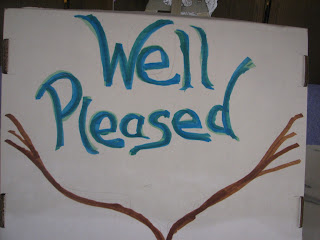The readings for Sunday, February 4, 2018:
First Reading: Isaiah 40:21-31
Psalm: Psalm 147:1-12, 21c (Psalm 147:1-11, 20c NRSV)
Second Reading: 1 Corinthians 9:16-23
Gospel: Mark 1:29-39
In today's Gospel, we see Jesus hard at work. Most of us are familiar with this aspect of the story. Jesus heals and casts out demons and heals some more.
But notice what he does in verse 35. He retreats. He goes to a lonely place to pray. He has to get up long before dawn to be able to have this private time for prayer. And he doesn't get to enjoy his time in solitary prayer for long. His disciples "pursue" him, and Jesus suggests they head to the next town.
It's what he was put on earth to do, after all. He travels all around the area, preaching in the synagogues and healing and casting out demons. I must confess that I hadn't noticed all the casting out of demons until recent readings. It's interesting to think about the demand for this particular skill.
But it's important not to lose sight of what fuels his activity. Throughout the Gospels we see Jesus preaching, feeding, teaching, healing--and periodically, he withdraws to pray. In his book, Tell It Slant, Eugene H. Peterson says, "Story and prayer are the core language of our humanity. We say most truly who we are when we tell stories to one another and pray to our Lord. Story and prayer are also the core language of our Scriptures: God tells us who he is, completely revealed in Jesus, the Word made flesh who completed 'the works that the Father has given me to complete' (John 5:36) and all the while is attentively listening and obediently answering, as a Son to his Father--praying. Our Scriptures consist mostly of stories and prayers. We enter most appropriately into that revelation when we listen and tell stories to one another and listen and speak to God in prayer" (160).
Most of us mirror Jesus in how busy our lives have become. Most of my friends report feeling like someone is always there, wanting, needing something from them. They get irritable. Some days, I think that older people, especially women, break their bones because they've had a whole life of people sucking the marrow right out of them. But what can we do, especially in this economy?
I think of Simon Peter's mother-in-law in the story, who jumps up from her sick bed to cook. That's how I interpret "to serve them." And now think of Jesus, also called to serve--a woman's destiny, in ancient times and in ours. Jesus could have chosen a different path. The powers that he commands could have put him on a leadership path, the way that we think of leadership: others serving us, doing what we say.
God calls us to a servant's destiny. We are put on earth to be of service to others, doing the same things that Jesus did: preaching, feeding, teaching, healing. But God doesn't expect us to do these things without periods of rest. We need times of retreat, even if we can only schedule short times. We need times of prayer. We need time to listen for God, because the cries of the needy can drown out the still, small voice of God. We need time to refresh, and the easiest way to renew ourselves for the tasks ahead is to pray. The world, with all its aching yearning, will still be there after we emerge from our time of retreat.
thinking too hard
5 years ago



































